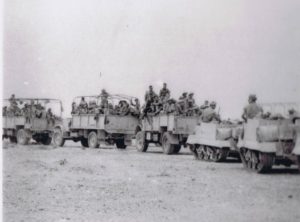The Cauldron
 1942
1942
A well-planned British defence held up the German advance on Tobruk and soon much of their armour was short of ammunition and fuel; as a result an Allied attack was mounted against enemy forces in an area known as The Cauldron, south of Tobruk.
The 10th Indian Brigade, supported by The 4th Royal Tank Regiment, began its assault early with 2nd Battalion, The Highland Light Infantry as right front battalion. Before long. 2HLI found itself surrounded by Germans on three sides.
British attempts to support the brigade failed and soon the whole formation was becoming isolated and in great danger of being over-run.
No British armour came forward to drive off the Panzers.
The Commanding Officer of 2HLI, Lieutenant Colonel Douglas Thorburn, personally implored the commander of an armoured squadron to provide the desperately-needed help, but he requested in vain: he was wounded while he was actually standing on the Squadron Commander’s tank. At one stage, a platoon of 2HLI was trapped and orders to fall back were nearly impossible to fulfil. One soldier, Private Campbell, was heard to call up ‘Withdrawal impossible!’ Then, firing his Bren from the hip, he charged a German tank.
The remains of 2HLI, were transferred to a composite brigade under Brigadier B. C. Fletcher, an HLI man who had commanded the HLI in the Eritrea campaign of 1941. At El Adem 2HLI reorganised : but not all the news was bad – during the day individual soldiers and small groups found their way back until, said the Battalion War Diary, ‘Our losses were not as great as we had feared’. Nonetheless the battalion had lost 231 all ranks – not as bad as other 74th and HLI losses in such battles as Assaye in 1803 or Festubert in 1915, but still a sore set-back.
Read More:
One of the most travelled battalions in the Regiment in World War II was 2nd Battalion The Highland Light Infantry(HLI). In 1942, it was part of the 10th Indian Brigade, 5th Indian Division, serving in the Western Desert, Africa.
A well-planned British defence held up the German advance and soon much of their armour was short of ammunition and fuel ; as a result an Allied attack was mounted against enemy forces in an area known as The Cauldron, south of Tobruk.
The 10th Indian Brigade, supported by The 4th Royal Tank Regiment, began its assault early on 5 June, with 2HLI as right front battalion. Despite heavy and effective enemy artillery fire, the attack began well and 2HLI took its objective and then began to dig in – difficult in the hard ground. Soon a German armoured counter-attack began, forcing 10th Indian Brigade into a difficult position : before long 2HLI found itself surrounded on three sides.
British attempts to support the brigade failed and soon the whole formation was becoming isolated and in great danger of being over-run.No British armour came forward to drive off the Panzers. The Commanding Officer of 2HLI, Lieutenant Colonel Douglas Thorburn, personally implored the commander of an armoured squadron to provide the desperately-needed help, but he requested in vain – he was wounded while he was actually standing on the Squadron Commander’s tank.
Despite providing a fierce defence, the struggle between armour and an unsupported infantry could have only one outcome – 10th Indian Brigade was becoming over-run and 2HLI had to fall back in order to avoid utter destruction. At one time every sub-unit and battalion headquarters were over-run by German tanks but the men were able to filter back between the enemy groups and so the fighting retreat continued.
Writing later about the battle, Rommel commented that the British Infantry lacked mobility, but they were extremely stubborn.
At one stage a platoon of the Battalion was trapped and orders to fall back were nearly impossible to fulfil. One soldier, Private Campbell, was heard to call up ‘Withdrawal impossible!’ Then, firing his Bren from the hip, he charged a German tank.
The Cauldron had been as hard a battle as Assaye, 2HLI were left unsupported under fierce counter- attacks and this time with no help from the cavalry, but, as at Assaye, the Battalion remained unbroken.
An astonishingly heavy rainstorm broke over El Adem on the night of the 6th ; in the Western Desert rain normally fell only three or four times a year. ‘A good thing’ wrote Captain Dick Bromley- Gardner of the HLI, in his diary, ‘it washed the blood off our vehicles’.
